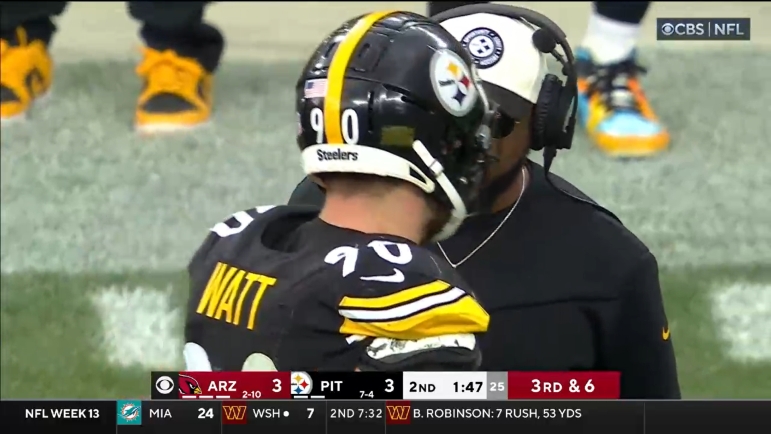Leave it to Pittsburgh Steelers OLB T.J. Watt to remind us of just what people mean when they call Mike Tomlin a player’s coach. We all bring our assumptions to the table about what that means, tinged by our personal biases. But it’s certainly not about being everybody’s personal cheerleader. Indeed, not for the first time, Watt explained how stepping into the film room with Tomlin is a nerve-wracking experience.
“When you come in the team meeting room, you don’t know what he’s gonna show,” he told Mike Florio and Chris Simms on Pro Football Talk. “Everybody kind of has a little nervous feel. We’re all looking around at each other, like, ‘What play?’ And when that play pops up, you immediately know before he even hits play, ‘Oh, it’s my play’”.
The film room is the great equalizer, in which everyone is fair game. We’ve heard from many players talking about this over the years, including Cameron Heyward, Joe Haden and Patrick Peterson. Just as Bill Belichick with Tom Brady, everybody is an equal on the field. Why? Because, as they say, the tape doesn’t lie.
“You could be talking to him outside the meeting room cool, like, ‘How’s the family? How’s everything going?’ Really nice, and all of a sudden you get in there, and that play comes on, and we’re like, ‘We were just cool outside, and now you’re gonna roast me in front of the whole team?’” Watt said. “It’s that accountability aspect of team meetings,” he added, that earns players’ respect.
Tomlin, like everybody else, may well have separate rules for different players in certain spaces. Antonio Brown certainly got away with a lot of things that a journeyman backup couldn’t dream of doing. In those settings, it’s about fairness, not equality.
But the film room is impartial, objective, and stoic. If you miss your assignment, the film tells you. If you loaf on a play, it’s there for everybody to see. And if the 53rd man makes a great play on special teams nobody cares about, the tape knows about it. And Tomlin will see it, whether it’s Watt or the 53rd man.
Surely, every player in that building has been on the wrong side of one of Tomlin’s open film sessions. The whole team or unit is there to learn from your mistakes or from your positive example. That’s what the film is for: to learn from and to get better. That’s from both the positives and the negatives. And it doesn’t matter who is on film. A catch isn’t better because George Pickens made it. A sack isn’t less impressive because Mykal Walker took the quarterback down.
And so it is that these public roasting sessions serve the team goal. Everyone in that room knows that if Tomlin is going to call out Watt for failing to set the edge, they all have to hold themselves to that same standard.








